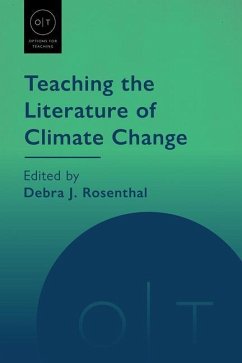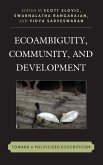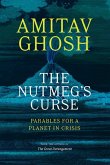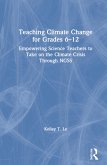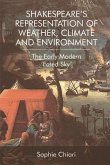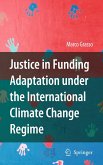Teaching the Literature of Climate Change
Herausgeber: Rosenthal, Debra J
Teaching the Literature of Climate Change
Herausgeber: Rosenthal, Debra J
- Gebundenes Buch
- Merkliste
- Auf die Merkliste
- Bewerten Bewerten
- Teilen
- Produkt teilen
- Produkterinnerung
- Produkterinnerung
Essays on teaching the global climate crisis through cli-fi. Emphasizing the importance of interdisciplinarity, this volume embraces literature as a means to cultivate students’ understanding of the ongoing climate crisis, ethics in times of disaster, and the intrinsic intersectionality of environmental issues.
Andere Kunden interessierten sich auch für
![Ecocriticism of the Global South Ecocriticism of the Global South]() Ecocriticism of the Global South133,99 €
Ecocriticism of the Global South133,99 €![Ecoambiguity, Community, and Development Ecoambiguity, Community, and Development]() Ecoambiguity, Community, and Development112,99 €
Ecoambiguity, Community, and Development112,99 €![The Nutmeg's Curse The Nutmeg's Curse]() Amitav GhoshThe Nutmeg's Curse21,99 €
Amitav GhoshThe Nutmeg's Curse21,99 €![Teaching Climate Change for Grades 6-12 Teaching Climate Change for Grades 6-12]() Kelley T LêTeaching Climate Change for Grades 6-12129,99 €
Kelley T LêTeaching Climate Change for Grades 6-12129,99 €![Shakespeare's Representation of Weather, Climate and Environment Shakespeare's Representation of Weather, Climate and Environment]() Sophie ChiariShakespeare's Representation of Weather, Climate and Environment137,99 €
Sophie ChiariShakespeare's Representation of Weather, Climate and Environment137,99 €![Justice in Funding Adaptation Under the International Climate Change Regime Justice in Funding Adaptation Under the International Climate Change Regime]() Marco GrassoJustice in Funding Adaptation Under the International Climate Change Regime76,99 €
Marco GrassoJustice in Funding Adaptation Under the International Climate Change Regime76,99 €![The Oxford Encyclopedia of Climate Change Communication The Oxford Encyclopedia of Climate Change Communication]() Mike S SchäferThe Oxford Encyclopedia of Climate Change Communication610,99 €
Mike S SchäferThe Oxford Encyclopedia of Climate Change Communication610,99 €-
-
-
Essays on teaching the global climate crisis through cli-fi. Emphasizing the importance of interdisciplinarity, this volume embraces literature as a means to cultivate students’ understanding of the ongoing climate crisis, ethics in times of disaster, and the intrinsic intersectionality of environmental issues.
Produktdetails
- Produktdetails
- Verlag: Modern Language Association of America
- Seitenzahl: 344
- Erscheinungstermin: 26. April 2024
- Englisch
- Abmessung: 234mm x 154mm x 27mm
- Gewicht: 610g
- ISBN-13: 9781603296342
- ISBN-10: 1603296344
- Artikelnr.: 68465391
- Herstellerkennzeichnung
- Libri GmbH
- Europaallee 1
- 36244 Bad Hersfeld
- gpsr@libri.de
- Verlag: Modern Language Association of America
- Seitenzahl: 344
- Erscheinungstermin: 26. April 2024
- Englisch
- Abmessung: 234mm x 154mm x 27mm
- Gewicht: 610g
- ISBN-13: 9781603296342
- ISBN-10: 1603296344
- Artikelnr.: 68465391
- Herstellerkennzeichnung
- Libri GmbH
- Europaallee 1
- 36244 Bad Hersfeld
- gpsr@libri.de
* Introduction, by Debra J. Rosenthal
* Part I: Principles
* Climate Justice and the Literary Imagination, by Stef Craps
* Engaging Students and Global Weirding, by Andrew Hageman
* Toward a Critical Environmental Justice Pedagogy, by April Anson
* Changing Student Perceptions through Climate Literature, by Ted
Martinez
* Cli-Fi and Cultivating Cultural Agency, by Stephen Siperstein
* Climate Change Stories: Living and Dying in the Anthropocene, by Jo
Alyson Parker
* The Anthropocene as a Global Coming-of-Age Story: A Pedagogy in
Transition, by Sofia Ahlberg
* Apprehending Climate Change through Fiction and Film, by Matt
Burkhart
* Part II: Locations
* Sea-Level Rise, Low-Lying Islands, and Caribbean Lit er a ture, by
Christina Gerhardt
* Decolonizing Climate Knowledge: Kathy Jetn̄il-Kijiner's Poetry, by
Clare Echterling
* Sounding the Alarm of Climate Change in Caribbean Literature: Mayra
Montero's In the Palm of Darkness, by Mary Ann Gosser-Esquilín
* The Polymedial Aesthetics of Climate Change Drama, by Nassim W.
Balestrini
* Climate Change Narratives, Publics, and the Professional-Managerial
Class, by Parker Krieg
* Words in the World: The Work of an Environmental Literature Course in
a Coastal Florida City, by Thomas Hallock
* Part III: Texts
* Attention, Connection, Dialogue: Teaching Barbara Kingsolver's
Flight Behavior in the Climate Fiction Classroom, by Magdalena
Mączyńska
* Contemporary US Climate Fiction, by Teresa A. Goddu
* Margaret Atwood's Oryx and Crake and The Year of the Flood as Cli-Fi,
by Robert P. Marzec
* Cli-Nofi: Reading and Writing Creative Climate Nonfiction in a Prison
Classroom, by Jason de Lara Molesky
* Genres of Deep Time: Virginia Woolf's Orlando and the Orbis
Hypothesis, by Aaron Rosenberg
* Part IV: Courses and Interdisciplinarity
* It's the End of the World As We Know It: Utilizing
Interdisciplinarity to Teach Anthropocene Literature, by Hannah
Kroonblawd
* "It Will Take Years for the Picture to Emerge": Interdisciplinarity,
Intermedia Strategies, and Climate Narratives, by Patrick Whitmarsh
* Reading the Weather: Teaching the Literature of Climate Change at a
Polytechnic University, by Cynthia Schoolar Williams
* Imagining Just Futures: Teaching the Literature of Climate Change as
Social Responsibility, by Ali Brox
* Cli-Fi Linked to a Climate Science Course, by Debra J. Rosenthal and
Jeffrey Johansen
* Climate Fiction and the Global South, by Ben Jamieson Stanley and
Emily S. Davis
* Part V: Assignments
* Tuning In to Climate Change: Podcasts in the Classroom, by Orchid
Tierney
* The Literature of Climate Change and Information Literacy
Instruction, by Melissa Anderson
* Noticing, Time, and Angling: A Climate Change Syllabus, by Barbara
Leckie
* Possible Futures in a Warming World: Teaching Climate Models and
Other Climate Fictions, by Tobias Menely
* Part VI: Hopefulness and Beyond
* Finding Hope in Climate Literature: Solastalgia, Twilight Knowing,
and Unintended Consequences, by Kathryn Prince
* Ruin, Rebellion, Remaking: Environmental Justice in the Literature of
Climate Change, by Brianna R. Burke
* Now What? Moving Past Climate Change Anxiety in an Interdisciplinary
Community College Classroom, by Ria Banerjee
* Creative Responses to Climate Doom: Lessons from the Void, by Rick
Van Noy
* Stories from Our Future: Beyond the Binary of Climate Hope and Grief,
by Jennifer Atkinson
* Afterword: The Urgency of Slow Teaching, by Sarah Jaquette Ray
* Notes on Contributors
* Part I: Principles
* Climate Justice and the Literary Imagination, by Stef Craps
* Engaging Students and Global Weirding, by Andrew Hageman
* Toward a Critical Environmental Justice Pedagogy, by April Anson
* Changing Student Perceptions through Climate Literature, by Ted
Martinez
* Cli-Fi and Cultivating Cultural Agency, by Stephen Siperstein
* Climate Change Stories: Living and Dying in the Anthropocene, by Jo
Alyson Parker
* The Anthropocene as a Global Coming-of-Age Story: A Pedagogy in
Transition, by Sofia Ahlberg
* Apprehending Climate Change through Fiction and Film, by Matt
Burkhart
* Part II: Locations
* Sea-Level Rise, Low-Lying Islands, and Caribbean Lit er a ture, by
Christina Gerhardt
* Decolonizing Climate Knowledge: Kathy Jetn̄il-Kijiner's Poetry, by
Clare Echterling
* Sounding the Alarm of Climate Change in Caribbean Literature: Mayra
Montero's In the Palm of Darkness, by Mary Ann Gosser-Esquilín
* The Polymedial Aesthetics of Climate Change Drama, by Nassim W.
Balestrini
* Climate Change Narratives, Publics, and the Professional-Managerial
Class, by Parker Krieg
* Words in the World: The Work of an Environmental Literature Course in
a Coastal Florida City, by Thomas Hallock
* Part III: Texts
* Attention, Connection, Dialogue: Teaching Barbara Kingsolver's
Flight Behavior in the Climate Fiction Classroom, by Magdalena
Mączyńska
* Contemporary US Climate Fiction, by Teresa A. Goddu
* Margaret Atwood's Oryx and Crake and The Year of the Flood as Cli-Fi,
by Robert P. Marzec
* Cli-Nofi: Reading and Writing Creative Climate Nonfiction in a Prison
Classroom, by Jason de Lara Molesky
* Genres of Deep Time: Virginia Woolf's Orlando and the Orbis
Hypothesis, by Aaron Rosenberg
* Part IV: Courses and Interdisciplinarity
* It's the End of the World As We Know It: Utilizing
Interdisciplinarity to Teach Anthropocene Literature, by Hannah
Kroonblawd
* "It Will Take Years for the Picture to Emerge": Interdisciplinarity,
Intermedia Strategies, and Climate Narratives, by Patrick Whitmarsh
* Reading the Weather: Teaching the Literature of Climate Change at a
Polytechnic University, by Cynthia Schoolar Williams
* Imagining Just Futures: Teaching the Literature of Climate Change as
Social Responsibility, by Ali Brox
* Cli-Fi Linked to a Climate Science Course, by Debra J. Rosenthal and
Jeffrey Johansen
* Climate Fiction and the Global South, by Ben Jamieson Stanley and
Emily S. Davis
* Part V: Assignments
* Tuning In to Climate Change: Podcasts in the Classroom, by Orchid
Tierney
* The Literature of Climate Change and Information Literacy
Instruction, by Melissa Anderson
* Noticing, Time, and Angling: A Climate Change Syllabus, by Barbara
Leckie
* Possible Futures in a Warming World: Teaching Climate Models and
Other Climate Fictions, by Tobias Menely
* Part VI: Hopefulness and Beyond
* Finding Hope in Climate Literature: Solastalgia, Twilight Knowing,
and Unintended Consequences, by Kathryn Prince
* Ruin, Rebellion, Remaking: Environmental Justice in the Literature of
Climate Change, by Brianna R. Burke
* Now What? Moving Past Climate Change Anxiety in an Interdisciplinary
Community College Classroom, by Ria Banerjee
* Creative Responses to Climate Doom: Lessons from the Void, by Rick
Van Noy
* Stories from Our Future: Beyond the Binary of Climate Hope and Grief,
by Jennifer Atkinson
* Afterword: The Urgency of Slow Teaching, by Sarah Jaquette Ray
* Notes on Contributors
* Introduction, by Debra J. Rosenthal
* Part I: Principles
* Climate Justice and the Literary Imagination, by Stef Craps
* Engaging Students and Global Weirding, by Andrew Hageman
* Toward a Critical Environmental Justice Pedagogy, by April Anson
* Changing Student Perceptions through Climate Literature, by Ted
Martinez
* Cli-Fi and Cultivating Cultural Agency, by Stephen Siperstein
* Climate Change Stories: Living and Dying in the Anthropocene, by Jo
Alyson Parker
* The Anthropocene as a Global Coming-of-Age Story: A Pedagogy in
Transition, by Sofia Ahlberg
* Apprehending Climate Change through Fiction and Film, by Matt
Burkhart
* Part II: Locations
* Sea-Level Rise, Low-Lying Islands, and Caribbean Lit er a ture, by
Christina Gerhardt
* Decolonizing Climate Knowledge: Kathy Jetn̄il-Kijiner's Poetry, by
Clare Echterling
* Sounding the Alarm of Climate Change in Caribbean Literature: Mayra
Montero's In the Palm of Darkness, by Mary Ann Gosser-Esquilín
* The Polymedial Aesthetics of Climate Change Drama, by Nassim W.
Balestrini
* Climate Change Narratives, Publics, and the Professional-Managerial
Class, by Parker Krieg
* Words in the World: The Work of an Environmental Literature Course in
a Coastal Florida City, by Thomas Hallock
* Part III: Texts
* Attention, Connection, Dialogue: Teaching Barbara Kingsolver's
Flight Behavior in the Climate Fiction Classroom, by Magdalena
Mączyńska
* Contemporary US Climate Fiction, by Teresa A. Goddu
* Margaret Atwood's Oryx and Crake and The Year of the Flood as Cli-Fi,
by Robert P. Marzec
* Cli-Nofi: Reading and Writing Creative Climate Nonfiction in a Prison
Classroom, by Jason de Lara Molesky
* Genres of Deep Time: Virginia Woolf's Orlando and the Orbis
Hypothesis, by Aaron Rosenberg
* Part IV: Courses and Interdisciplinarity
* It's the End of the World As We Know It: Utilizing
Interdisciplinarity to Teach Anthropocene Literature, by Hannah
Kroonblawd
* "It Will Take Years for the Picture to Emerge": Interdisciplinarity,
Intermedia Strategies, and Climate Narratives, by Patrick Whitmarsh
* Reading the Weather: Teaching the Literature of Climate Change at a
Polytechnic University, by Cynthia Schoolar Williams
* Imagining Just Futures: Teaching the Literature of Climate Change as
Social Responsibility, by Ali Brox
* Cli-Fi Linked to a Climate Science Course, by Debra J. Rosenthal and
Jeffrey Johansen
* Climate Fiction and the Global South, by Ben Jamieson Stanley and
Emily S. Davis
* Part V: Assignments
* Tuning In to Climate Change: Podcasts in the Classroom, by Orchid
Tierney
* The Literature of Climate Change and Information Literacy
Instruction, by Melissa Anderson
* Noticing, Time, and Angling: A Climate Change Syllabus, by Barbara
Leckie
* Possible Futures in a Warming World: Teaching Climate Models and
Other Climate Fictions, by Tobias Menely
* Part VI: Hopefulness and Beyond
* Finding Hope in Climate Literature: Solastalgia, Twilight Knowing,
and Unintended Consequences, by Kathryn Prince
* Ruin, Rebellion, Remaking: Environmental Justice in the Literature of
Climate Change, by Brianna R. Burke
* Now What? Moving Past Climate Change Anxiety in an Interdisciplinary
Community College Classroom, by Ria Banerjee
* Creative Responses to Climate Doom: Lessons from the Void, by Rick
Van Noy
* Stories from Our Future: Beyond the Binary of Climate Hope and Grief,
by Jennifer Atkinson
* Afterword: The Urgency of Slow Teaching, by Sarah Jaquette Ray
* Notes on Contributors
* Part I: Principles
* Climate Justice and the Literary Imagination, by Stef Craps
* Engaging Students and Global Weirding, by Andrew Hageman
* Toward a Critical Environmental Justice Pedagogy, by April Anson
* Changing Student Perceptions through Climate Literature, by Ted
Martinez
* Cli-Fi and Cultivating Cultural Agency, by Stephen Siperstein
* Climate Change Stories: Living and Dying in the Anthropocene, by Jo
Alyson Parker
* The Anthropocene as a Global Coming-of-Age Story: A Pedagogy in
Transition, by Sofia Ahlberg
* Apprehending Climate Change through Fiction and Film, by Matt
Burkhart
* Part II: Locations
* Sea-Level Rise, Low-Lying Islands, and Caribbean Lit er a ture, by
Christina Gerhardt
* Decolonizing Climate Knowledge: Kathy Jetn̄il-Kijiner's Poetry, by
Clare Echterling
* Sounding the Alarm of Climate Change in Caribbean Literature: Mayra
Montero's In the Palm of Darkness, by Mary Ann Gosser-Esquilín
* The Polymedial Aesthetics of Climate Change Drama, by Nassim W.
Balestrini
* Climate Change Narratives, Publics, and the Professional-Managerial
Class, by Parker Krieg
* Words in the World: The Work of an Environmental Literature Course in
a Coastal Florida City, by Thomas Hallock
* Part III: Texts
* Attention, Connection, Dialogue: Teaching Barbara Kingsolver's
Flight Behavior in the Climate Fiction Classroom, by Magdalena
Mączyńska
* Contemporary US Climate Fiction, by Teresa A. Goddu
* Margaret Atwood's Oryx and Crake and The Year of the Flood as Cli-Fi,
by Robert P. Marzec
* Cli-Nofi: Reading and Writing Creative Climate Nonfiction in a Prison
Classroom, by Jason de Lara Molesky
* Genres of Deep Time: Virginia Woolf's Orlando and the Orbis
Hypothesis, by Aaron Rosenberg
* Part IV: Courses and Interdisciplinarity
* It's the End of the World As We Know It: Utilizing
Interdisciplinarity to Teach Anthropocene Literature, by Hannah
Kroonblawd
* "It Will Take Years for the Picture to Emerge": Interdisciplinarity,
Intermedia Strategies, and Climate Narratives, by Patrick Whitmarsh
* Reading the Weather: Teaching the Literature of Climate Change at a
Polytechnic University, by Cynthia Schoolar Williams
* Imagining Just Futures: Teaching the Literature of Climate Change as
Social Responsibility, by Ali Brox
* Cli-Fi Linked to a Climate Science Course, by Debra J. Rosenthal and
Jeffrey Johansen
* Climate Fiction and the Global South, by Ben Jamieson Stanley and
Emily S. Davis
* Part V: Assignments
* Tuning In to Climate Change: Podcasts in the Classroom, by Orchid
Tierney
* The Literature of Climate Change and Information Literacy
Instruction, by Melissa Anderson
* Noticing, Time, and Angling: A Climate Change Syllabus, by Barbara
Leckie
* Possible Futures in a Warming World: Teaching Climate Models and
Other Climate Fictions, by Tobias Menely
* Part VI: Hopefulness and Beyond
* Finding Hope in Climate Literature: Solastalgia, Twilight Knowing,
and Unintended Consequences, by Kathryn Prince
* Ruin, Rebellion, Remaking: Environmental Justice in the Literature of
Climate Change, by Brianna R. Burke
* Now What? Moving Past Climate Change Anxiety in an Interdisciplinary
Community College Classroom, by Ria Banerjee
* Creative Responses to Climate Doom: Lessons from the Void, by Rick
Van Noy
* Stories from Our Future: Beyond the Binary of Climate Hope and Grief,
by Jennifer Atkinson
* Afterword: The Urgency of Slow Teaching, by Sarah Jaquette Ray
* Notes on Contributors

